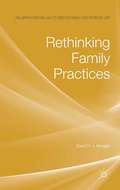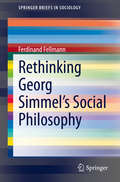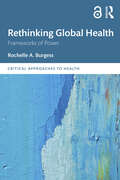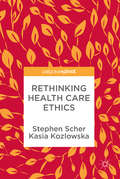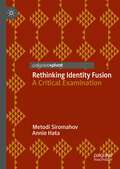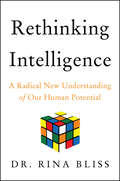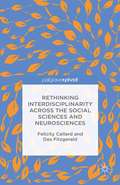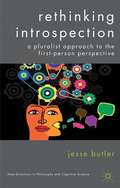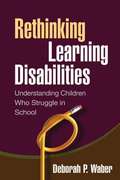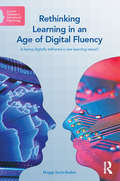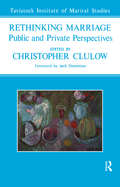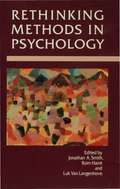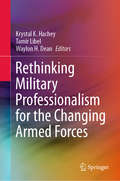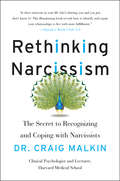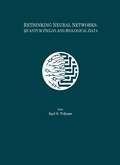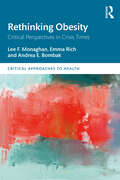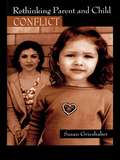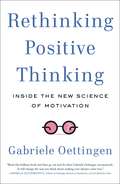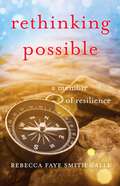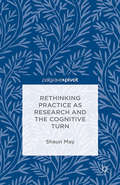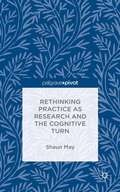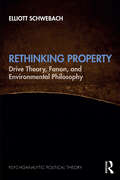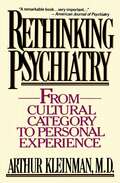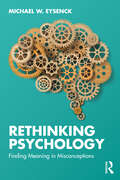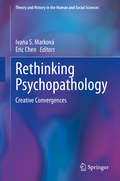- Table View
- List View
Rethinking Family Practices (Palgrave Macmillan Studies in Family and Intimate Life)
by D. MorganLeading family sociologist David Morgan revisits his highly influential 'family practices' approach in this new book. Exploring its impact, and how it has been critiqued, Morgan shows the continued relevance of the approach with reference to time and space, the body, emotions, ethics and work/life balance.
Rethinking Georg Simmel's Social Philosophy (SpringerBriefs in Sociology)
by Ferdinand FellmannThis textbook examines interaction, reciprocity, dualism, conflict, and personality in the work of Georg Simmel. These themes, which made Simmel the founder of relational sociology, are presented uniquely in the light of intimate relations. According to Simmel, intimate relations rather than the individual constitute the fundamental stratum of human culture. By relating objective social facts to subjective experience, Simmel also opened up a new way of understanding human life in the early 20th century. Using Simmel’s theory of reciprocity, this book follows an innovative method of interpretation, providing a quantitative perspective of lived experience. This book analyzes Simmel’s ideas from the viewpoint of modern hermeneutical philosophy and sociology. Fellmann expertly presents the historical context of Simmel’s concepts, and their influence on other sociologists and philosophers, especially in Germany. Written in an engaging style, this book is suitable as a core text in undergraduate and graduate courses on sociological theory and continental philosophy. Additionally, given the new focus on Simmel and intimate relations, the book is of interest to scholars of relational sociology, history of sociology, continental philosophy, history of philosophy, philosophy of culture, and philosophical anthropology.
Rethinking Global Health: Frameworks of Power (Critical Approaches to Health)
by Rochelle A. BurgessThis book reflects and analyses the working of power in the field of global health– and what this goes on to produce. In so doing, Rethinking Global Health asks the pivotal questions of, ‘who is global health for’ and ‘what is it that limits our ability to build responses that meet people where they are?’ Covering a wide range of topics from global mental health to Ebola, this book combines power analyses with interviews and personal reflections spanning the author’s decade-long career in global health. It interrogates how the search for global solutions can often end up far from where we anticipated. It also introduces readers to different frameworks for power analyses in the field, including an adaptation of the ‘matrix of domination’ for global health practice. Through this work, Dr Burgess develops a new model of Transformative Global Health, a framework that calls researchers and practitioners to adopt new orienting principles, placing community interests and voices at the heart of global health planning and solutions at all times. This book will be beneficial to students and academics working in the global and public health landscape. It will also hold appeal to activists, practitioners and individuals invested in the discipline and in health equity around the world.
Rethinking Health Care Ethics
by Stephen Scher Kasia KozlowskaThe goal of this open access book is to develop an approach to clinical health care ethics that is more accessible to, and usable by, health professionals than the now-dominant approaches that focus, for example, on the application of ethical principles. The book elaborates the view that health professionals have the emotional and intellectual resources to discuss and address ethical issues in clinical health care without needing to rely on the expertise of bioethicists. The early chapters review the history of bioethics and explain how academics from outside health care came to dominate the field of health care ethics, both in professional schools and in clinical health care. The middle chapters elaborate a series of concepts, drawn from philosophy and the social sciences, that set the stage for developing a framework that builds upon the individual moral experience of health professionals, that explains the discontinuities between the demands of bioethics and the experience and perceptions of health professionals, and that enables the articulation of a full theory of clinical ethics with clinicians themselves as the foundation. Against that background, the first of three chapters on professional education presents a general framework for teaching clinical ethics; the second discusses how to integrate ethics into formal health care curricula; and the third addresses the opportunities for teaching available in clinical settings. The final chapter, "Empowering Clinicians", brings together the various dimensions of the argument and anticipates potential questions about the framework developed in earlier chapters.
Rethinking Identity Fusion: A Critical Examination
by Metodi Siromahov Annie HataRethinking Identity Fusion presents a critique of Identity Fusion Theory, an identity-based social psychological approach to understanding pro-group extremism. It scrutinises the theory’s main theoretical claims and research methods, exposing serious inconsistencies and gaps in how the theory handles the concept of identity and in its research programme. The book demonstrates the flattening of the theory’s main concept, “identity fusion”, and the general state of confusion in the recent literature as to the theory’s claims and predictions.The book offers a reinterpretation of Identity Fusion Theory through a discursive perspective, critiquing its cognitivist assumptions about the nature of human relationships and identity. In this way, its scope extends to wider critiques of experimental and quantitative methods in contemporary social psychology. It argues that such theoretical and methodological shortcomings, rather than hindering a flawed approach, can accelerate its adoption in social psychology by creating an image of theoretical unity and consistency on top of a field characterised by confusion and contradiction.
Rethinking Intelligence: A Radical New Understanding of Our Human Potential
by Rina BlissA genetics expert and professor challenges our understanding of intelligence, explaining what it truly means to be “smart,” why conventional assessments are misleading, and what everyone can do to optimize their potential.Growing up in middle-class suburban Los Angeles in the 1980s, Rina Bliss was saw intelligence as her ticket out. Like height and stature, intelligence was said to run in families. The prevailing idea was that mental capacity was determined by our DNA and could be measured; a simple IQ test could predict a child’s future.Yet, once Dr. Bliss looked closer, first as a student, then as a scientist, and later as a mom of identical twins who share a genome, she began to challenge conventional wisdom about innate intelligence. In Rethinking Intelligence, she shares her findings, drawing on cutting-edge scientific research to offer a new model for how we understand, define, and assess intelligence, using a measurement that is far more flexible and expansive.Intelligence has little to do with standardized test results or other conventional measures of intellect, Dr. Bliss argues. Intelligence is a process, a journey defined by change that cannot be scored or taken away. Intelligence is influenced by our surroundings in ways that are often overlooked—more than Baby Mozart or flash cards or superfoods, factors like stress, connection, and play actually sculpt young minds.In Rethinking Intelligence, Dr. Bliss shares insights from the burgeoning science of epigenetics to help us harness our environments to empower our minds. If we truly want to nurture potential, we must eliminate toxic stress so that our genes can work optimally, in harmony with our environment. Dr. Bliss offers successful strategies we can use as individuals and a society, including embracing a growth mindset, prioritizing connection, becoming more mindful, and reforming systemic issues—poverty, racism, the lack of quality early childhood education—that have a negative and lasting neurobiological impact.Joining acclaimed works by Carol Dweck, Amy Cuddy, and James Clear, Rethinking Intelligence reframes human behavior and intellect, offering a new perspective for understanding ourselves and our children, and the practical tools necessary to thrive.
Rethinking Interdisciplinarity across the Social Sciences and Neurosciences
by F. Callard D. FitzgeraldThis book offers a provocative account of interdisciplinary research across the neurosciences, social sciences and humanities. Rooting itself in the authors' own experiences, the book establishes a radical agenda for collaboration across these disciplines. This book is open access under a CC-BY license.
Rethinking Introspection
by Jesse ButlerWe seem to have private privileged access to our own minds through introspection, but what exactly does this involve? Do we somehow literally perceive our own minds, as the common idea of a 'mind's eye' suggests, or are there other processes at work in our ability to know our own minds? Rethinking Introspection offers a new pluralist framework for understanding the nature, scope, and limits of introspection. The book argues that, contrary to common misconceptions, introspection does not consist of a single mechanism but rather a diverse range of mental states and cognitive processes with a broad spectrum of epistemic properties. Building upon this revised conception of introspection, the book illustrates and analyzes the variety of ways in which we introspectively grasp the contents of our own minds, from the immediate phenomenal knowledge generated by conscious experience to the self-deceptive possibilities enabled by certain kinds of inner speech.
Rethinking Learning Disabilities: Understanding Children Who Struggle in School
by Deborah WaberExperts have yet to reach consensus about what a learning disability is, how to determine if a child has one, and what to do about it. Leading researcher and clinician Deborah Waber offers an alternative to the prevailing view of learning disability as a problem contained within the child. Instead, she shows how learning difficulties are best understood as a function of the developmental interaction between the child and the world. Integrating findings from education, developmental psychology, and cognitive neuroscience, she offers a novel approach with direct practical implications. Detailed real-world case studies illustrate how this approach can promote positive outcomes for children who struggle in school.
Rethinking Learning in an Age of Digital Fluency: Is being digitally tethered a new learning nexus? (Current Debates in Educational Psychology)
by Maggi Savin-Baden"This is a book that I am going to have to own, and will work to find contexts in which to recommend. It cuts obliquely through so many important domains of evidence and scholarship that it cannot but be a valuable stimulus" -Hamish Macleod, University of Edinburgh Digital connectivity is a phenomenon of the 21st century and while many have debated its impact on society, few have researched relationship between the changes taking place and the actual impact on learning. Rethinking Learning in an Age of Digital Fluency examines what kind of impact an increasingly connected environment is having on learning and what kind of culture it is creating within learning settings. Engagement with digital media and navigating through digital spaces with ease is something that many young people appear to do well, although the tangible benefits of this are unclear. This book, therefore, will present an overview of current research and practice in the area of digital tethering, whilst examining how it could be used to harness new learning and engagement practices that are fit for the modern age. Questions that the book also addresses include: Is being digital tethered a new learning nexus? Are social networking sites spaces for co-production of knowledge and spaces of inclusive learning? Are students who are digitally tethered creating new learning maps and pedagogies? Does digital tethering enable students to use digital media to create new learning spaces? This fascinating and at times controversial text engages with numerous aspects of digital learning amongst undergraduate students including mobile learning, individual and collaborative learning, viral networking, self-publication and identity dissemination. It will be of enormous interest to researchers and students in education and educational psychology.
Rethinking Marriage: Public and Private Perspectives
by Christopher Clulow'This book brings together a group of specialists who attempt to describe the process of interaction between the inner and personal and the outer and social. They illustrate what is happening to current marriage, particularly in its daily intimate experience. They do not attmpt to offer expert solutions. They describe practice as they see it.'This book is a valuable study to help the clarification of the complex world of contemporary marriage, particularly as it stresses the dynamic aspects of the marital relationship which are the key to its present aspirations. It is a study which informs both the expert and the lay reader, helping to make sense of the necessary diverse realities which make up marriage today.'- from the Foreword by Jack Dominian.
Rethinking Methods in Psychology (Rethinking Psychology Ser.)
by Professor Rom Harre Professor Jonathan A Smith Luk Van LangenhoveThe recent widespread rejection of conventional theory and method has led to the evolution of different ways of gathering and analyzing data. This accessible textbook introduces key research methods that challenge psychology's traditional preoccupation with `scientific' experiments. The book provides a well-structured guide to methods, containing a range of qualitative approaches (for example, semi-structured interviews, grounded theory, discourse analysis) alongside a reworking of quantitative methods to suit contemporary psychological research. A number of chapters are also explicitly concerned with research as a dynamic interactive process. The internationally respected contributors steer the reader through the main stages of conducting a study using these methods.
Rethinking Military Professionalism for the Changing Armed Forces
by Waylon H. Dean Tamir Libel Krystal K. HacheyThis book will make a first contribution to identify the gaps in current practices and provide alternative mechanisms to conceptualize professionalism that is reflective of changing requirements, culture, and demographics of the contemporary military force.The military profession promotes the development, sustainment, and embodiment of ethos, which guides conduct across operational contexts, from times of national and international crises and security challenges (e.g., war, natural disasters, and peace support operations). It is imperative for military leaders to understand how ethos and doctrine shape professional frameworks, which guide the conduct of military members.
Rethinking Narcissism: The Bad---and Surprising Good---About Feeling Special
by Craig MalkinAre you a narcissist?"What is narcissism?" is one of the fastest-rising searches on Google, and articles on the topic routinely go viral. Yet the word "narcissism" seems to mean something different each time it's uttered. <P><P>In fact, the more it's slung about, the more elusive its true meaning becomes. The only certainty, it would seem, is that it's "bad" to be a narcissist--really bad. That's terrible news for millennials, who've been branded "the most narcissistic generation ever." <P>In Rethinking Narcissism, Dr. Craig Malkin--a Harvard Medical School Instructor and clinical psychologist with more than two decades of clinical experience--offers a radically new model for understanding this often misused term. <P>Narcissism, argues Dr. Malkin, is essentially a spectrum of self-importance--and everyone falls somewhere on the scale between utter selflessness and total arrogance. When we casually invoke the term "narcissist," most of us are referring to the outer edge of the spectrum, which can shade into dangerous psychopathy. <P>But there are also those who live at the lower end of the spectrum--dubbed "echoists" by Dr. Malkin. These, too, are people we know; people so fearful of attention or acknowledgment that they often seem to have no voice at all.Drawing on his own research as well as on the latest findings in psychology, Dr. Malkin uses vivid stories of people from all walks of life to teach concrete strategies for spotting--and coping with--excessive narcissism. <P>At the same time, he explains why embracing some degree of narcissism--the drive to feel special--is essential to maintaining a healthy sense of self-worth. Using his new tool, the Narcissism Test, he not only guides readers through the process of measuring their narcissism, but also offers step-by-step advice to prevent unhealthy narcissism and to nurture healthy narcissism--in ourselves as well as in our partners, our colleagues, and our children. <P>As practical as it is wise, Rethinking Narcissism doesn't just help people avoid the temptations and dangers of extreme narcissism--and narcissists--in both the real world and cyberspace; it helps everyone, including people who don't feel special enough, to find their voices and live a more passionate, fulfilling life.
Rethinking Neural Networks: Quantum Fields and Biological Data (INNS Series of Texts, Monographs, and Proceedings Series)
by John Eccles Karl H. PribramThe result of the first Appalachian Conference on neurodynamics, this volume focuses on processing in biological neural networks. How do brain processes become organized during decision making? That is, what are the neural antecedents that determine which course of action is to be pursued? Half of the contributions deal with modelling synapto-dendritic and neural ultrastructural processes; the remainder, with laboratory research findings, often cast in terms of the models. The interchanges at the conference and the ensuing publication also provide a foundation for further meetings. These will address how processes in different brain systems, coactive with the neural residues of experience and with sensory input, determine decisions.
Rethinking Obesity: Critical Perspectives in Crisis Times (Critical Approaches to Health)
by Emma Rich Lee F. Monaghan Andrea E. BombakTheoretically informed and empirically grounded, Rethinking Obesity invites readers to reconsider the medical and public health framing of population weight (gain) as a massive global problem, epidemic or crisis. Attentive to social values, scientific uncertainty and possible harms, the book furthers critique of the weight-centred health paradigm and world war on obesity. Building upon existing international literature from critical weight studies, fat studies and critical obesity research, the book advances scholarship with reference to body politics and health policy, epidemiology and obesity science, media reporting and weight-related stigma. The authors resist the common moralised narrative that ‘the overweight majority’ are lazy, gluttonous, and personally responsible for their actual or potential ills and the solution ultimately necessitates individual lifestyle change. Critique is also extended to seemingly compassionate public health interventions that putatively avoid victim-blaming through an appeal to ‘the obesogenic environment’, a consequence of modern living. Empirical case studies are grounded in women’s repeated and often frustrating experiences of dieting and schoolgirls’ encounters with fat pedagogy, which challenges dominant obesity discourse. Recognising that declared public health crises may become layered and cascade through society, this book also includes timely research on the COVID-19 pandemic response amidst concerns about lockdown weight-gain, heightened risk of infection and death among people deemed overweight and obese. Rethinking Obesity interrogates how social injustice is reproduced not only through cruelty but also through seemingly benevolent representations, pedagogies and policies. Alternative approaches and action, ranging from weight-inclusive health paradigms to broader social change, are also considered when seeking to foster collective hope in crisis times. This is valuable reading for students and researchers in medical sociology, social and population health sciences, physical education, critical weight and fat studies, and the social dimensions of the body.
Rethinking Parent and Child Conflict (Changing Images of Early Childhood)
by Susan GrieshaberThe book draws from Foucault's notion of power-knowledge-resistance and feminist poststructuralism to offer a re-theorization of parent-child conflict.
Rethinking Positive Thinking
by Gabriele Oettingen"The solution isn't to do away with dreaming and positive thinking. Rather, it's making the most of our fantasies by brushing them up against the very thing most of us are taught to ignore or diminish: the obstacles that stand in our way."So often in our day-to-day lives we're inundated with advice to "think positively." From pop music to political speeches to commercials, the general message is the same: look on the bright side, be optimistic in the face of adversity, and focus on your dreams. And whether we're trying to motivate ourselves to lose weight, snag a promotion at work, or run a marathon, we're told time and time again that focusing on fulfilling our wishes will make them come true.Gabriele Oettingen draws on more than twenty years of research in the science of human motivation to reveal why the conventional wisdom falls short. The obstacles that we think prevent us from realizing our deepest wishes can actually lead to their fulfillment. Starry-eyed dreaming isn't all it's cracked up to be, and as it turns out, dreamers are not often doers.While optimism can help us alleviate immediate suffering and persevere in challenging times, merely dreaming about the future actually makes people more frustrated and unhappy over the long term and less likely to achieve their goals. In fact, the pleasure we gain from positive fantasies allows us to fulfill our wishes virtually, sapping our energy to perform the hard work of meeting challenges and achieving goals in real life.Based on her groundbreaking research and large-scale scientific studies, Oettingen introduces a new way to visualize the future, called mental contrasting. It combines focusing on our dreams with visualizing the obstacles that stand in our way. By experiencing our dreams in our minds and facing reality we can address our fears, make concrete plans, and gain energy to take action.In Rethinking Positive Thinking, Oettingen applies mental contrasting to three key areas of personal change-- becoming healthier, nurturing personal and professional relationships, and performing better at work. She introduces readers to the key phases of mental contrasting using a proven four-step process called WOOP--Wish, Outcome, Obstacle, Plan--and offers advice and exercises on how to best apply this method to daily life. Through mental contrasting, people in Oettingen's studies have become significantly more motivated to quit smoking, lose weight, get better grades, sustain fulfilling relationships, and negotiate more effectively in business situations.Whether you are unhappy and struggling with serious problems or you just want to improve, discover, and explore new opportunities, this book will deepen your ideas about human motivation and help you boldly chart a new path ahead.
Rethinking Possible: A Memoir of Resilience
by Rebecca Faye GalliBecky Galli was born into a family that valued the power of having a plan. With a pastor father and a stay-at-home mother, her 1960s southern upbringing was bucolic—even enviable. But when her brother, only seventeen, died in a waterskiing accident, the slow unraveling of her perfect family began. Though grief overwhelmed the family, twenty-year-old Galli forged onward with her life plans—marriage, career, and raising a family of her own—one she hoped would be as idyllic as the family she once knew. But life had less than ideal plans in store. There was her son&’s degenerative, undiagnosed disease and subsequent death; followed by her daughter&’s autism diagnosis; her separation; and then, nine days after the divorce was final, the onset of the transverse myelitis that would leave Galli paralyzed from the waist down. Despite such unspeakable tragedy, Galli maintained her belief in family, in faith, in loving unconditionally, and in learning to not only accept, but also embrace a life that had veered down a path far different from the one she had envisioned. At once heartbreaking and inspiring, Rethinking Possible is a story about the power of love over loss and the choices we all make that shape our lives —especially when forced to confront the unimaginable.
Rethinking Practice as Research and the Cognitive Turn
by S. MayThe last 15 years has seen an explosion of studies that use cognitive science to understand theatre, whilst at the same time theatre-makers are using their artistic practice to address research question. This book looks at the current discourse around these emerging fields.
Rethinking Practice as Research and the Cognitive Turn
by Shaun MayRethinking Practice as Research and the Cognitive Turn.
Rethinking Property: Drive Theory, Fanon, and Environmental Philosophy (Psychoanalytic Political Theory)
by Elliott SchwebachIn this eye-opening study at the intersection of psychoanalytic theory and political organization and thought, Elliott Schwebach explores why property can be understood to be oppressive and how political theory overlooks its unique significance as a pillar of social violence.Synthesizing insights from Pierre-Joseph Proudhon, Sigmund Freud, Ives Hendrick, and Frantz Fanon, Schwebach investigates human activity as shaped by the effects of property regimes and traces broader implications for understanding the legacies of colonial domination. He then shifts focus to contemporary eco-theory, challenging the Lockeanism that continues to characterize premodern Indigenous environmental engagements and presenting novel frameworks for understanding healthy ecopolitical activity based upon the trajectories of psychological drives.This unique perspective validates creative expressions of decolonial resistance and offers fruitful alternatives to customary positions in psychoanalytic and environmental political philosophy. The book will be an indispensable resource for scholars of property, Freudian psychology, political ecology, and the visionary thought of Frantz Fanon.
Rethinking Psychiatry: From Cultural Category to Personal Experience
by Arthur KleinmanArthur Kleinman, a psychiatrist and medical anthropologist, approaches psychiatric diagnosis and the concepts of disease and illness from cross-cultural and anthropological perspectives.
Rethinking Psychology: Finding Meaning in Misconceptions
by Michael W. EysenckCan subliminal messages motivate behaviour? Can you train your brain to increase your intelligence? Does parenting style affect personality?Psychologists and non-psychologists looking to understand human behaviour and cognition are forced to contend with a number of complexities unique to the field. Not least amongst these is the fact that psychology lacks the superficially attractive precision of theories in the hard sciences. It is inevitable, then, that non-psychologists are susceptible to numerous psychological myths.In this thought-provoking exploration of 43 of the most common psychological myths, Michael W. Eysenck examines the complexity of psychological science as well as the distortion of data, not only through the media, but also by researchers, textbook writers, and individuals themselves. He challenges the notion that the substantial progress made by psychology has provided enough convincing experimental evidence to successfully demolish these inaccuracies and explores the ways in which psychological research should be systematically improved so that psychology can take its place as a robust scientific discipline. Highly engaging, this is an informative read for psychologists at all levels, as well as members of the general public interested in challenging their own psychological understanding.
Rethinking Psychopathology: Creative Convergences (Theory and History in the Human and Social Sciences)
by Ivana S. Marková Eric ChenThis book presents an original approach to the study of psychiatry that is based on a justified epistemological position, which demands that both the natural and the human/social sciences are necessary in developing our understanding. Psychiatry as a medical specialism was constructed in the nineteenth century through the interplay of both the natural sciences and the human/social sciences. This interplay has created a hybrid discipline that spans biological and socio-cultural-historical domains, which has raised challenges for its understanding and research. This book focuses on one of the principal challenges – how can we explore mental symptoms and mental disorders as complexes of neurobiology on the one hand and meaning on the other?The chapters in this book, dedicated to Germán E Berrios, founder of the Cambridge school of psychopathology, tackles distinctive aspects of psychopathology or related areas. By means of a combination of approaches, chapters seek to unfold another element in our understanding of this field as well as raise new directions for its further study. Rethinking Psychopathology is a valuable resource for clinical psychologists and psychotherapists, psychological researchers, historians of psychology, cultural psychologists, critical psychologists, social scientists, philosophers of psychology, and philosophers of science.
